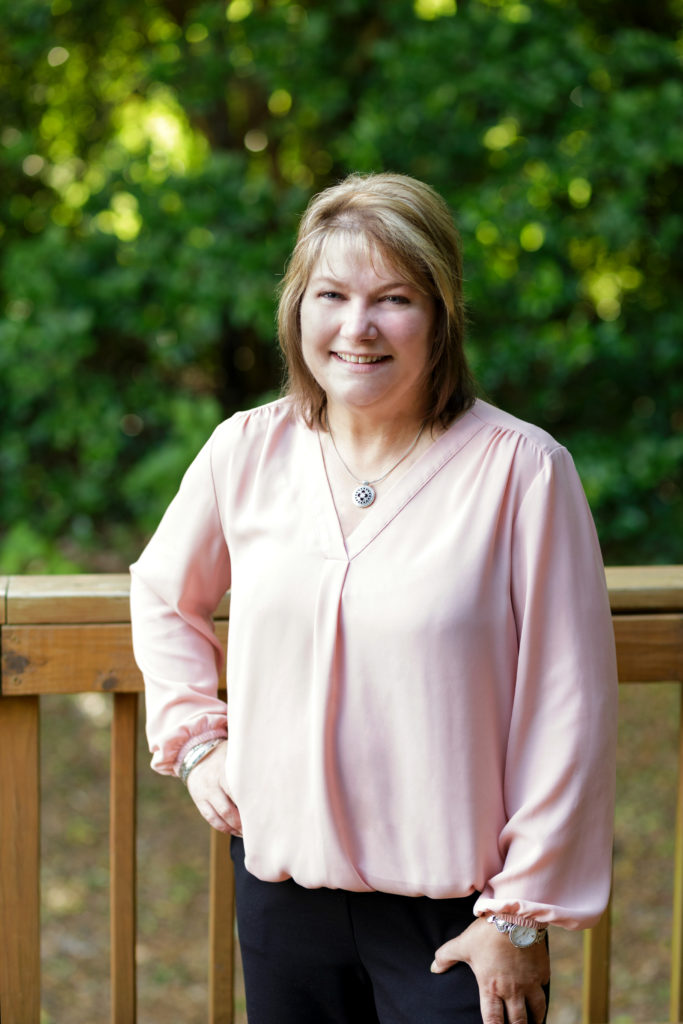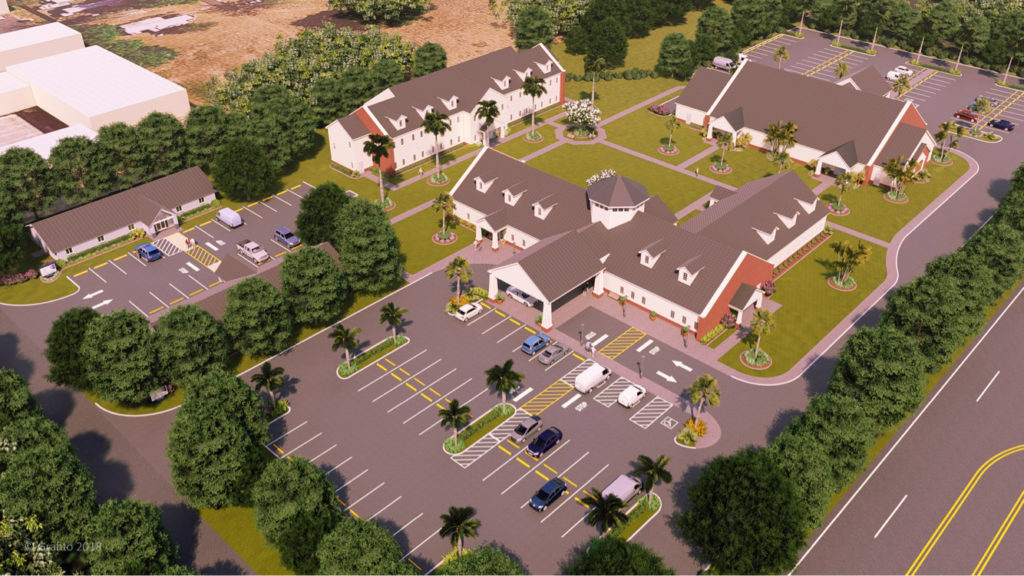The Florida Center for the Blind is a beacon of light for those living in the shadowy world of the visually impaired. The center provides rehabilitation, on-site classroom training and one-on-one, in-home instruction for those in need. The Ocala-based nonprofit organization serves eight counties, utilizes a staff of 14 and provides services for 220 people.
 “Our primary goal is to provide independence for persons with visual impairment or blindness,” says President and CEO Anissa Pieriboni. “We provide services for clients from birth to end of life, and each age group has its own unique set of needs. Each of our services is custom-designed to provide specific instruction to our clients so they can function successfully on their own in a sighted world.”
“Our primary goal is to provide independence for persons with visual impairment or blindness,” says President and CEO Anissa Pieriboni. “We provide services for clients from birth to end of life, and each age group has its own unique set of needs. Each of our services is custom-designed to provide specific instruction to our clients so they can function successfully on their own in a sighted world.”
There is no cost for those served by the center, and it has nine programs to assist the visually impaired and blind: the Children’s Program, Transition for Teens, Independent Living Skills, Vocational Rehabilitation/Job Readiness, Orientation and Mobility, Access Technology, Braille Instruction, Enrichment Classes and Information and Referral.
Pieriboni says that all of their programs are very important, but three in particular stand out: the Children’s Program, Access Technology and Independent Living Skills.
“Our Children’s Program helps provide a foundation of information for all visually impaired children, but especially for those who are born blind or lose their sight at a very early age,” she says. “Research shows that 85 percent of what we learn comes through sight. If you watch a sighted baby looking at the world around them, they observe and mimic the actions they see. When a child doesn’t have the ability to observe, it’s obvious that this puts him or her at an early disadvantage. We teach visually impaired and blind newborns and young children to learn to interpret the world around them by using their other senses. Most of this learning comes through touch, so we teach them how to feel their world… how to learn by shape and texture. It’s this foundation that will enable them to properly process the world they live in for the rest of their lives.
“Through Access Technology, clients are taught to use the latest technological advances to explore and interpret their world. For example, companies such as Apple have provided programs like VoiceOver to give vision-impaired persons the ability to use a cellphone to make calls, read and answer emails and access all the information provided by the internet. We search out the latest programs or devices available and instruct our clients how to utilize them to their fullest extent.
“Independent Living Skills are taught both here at the center and in the client’s home. Since our main goal is independence, we consider this service to be of vital importance. We go into the client’s home and teach him or her how to live their best and most comfortable life while coping with the demands of blindness. Something as simple as marking a microwave oven with small braille stick-on tabs can make a world of difference in ease of daily living.”
The center also works in conjunction with local school districts to teach school-age visually impaired children. Instructors from the center travel to area schools and, on a set schedule, take the children out of their regular classes to provide special instruction in areas such as braille, orientation and mobility, and access technology.
“The only drawback to this approach,” says Pieriboni, “is that when students are taken out of regular classes for instruction by our staff, they fall behind in whatever is being taught in their absence.”
The Cost Of Helping
Pieriboni says that the Florida Center for the Blind is funded primarily by the Florida Department of Education: Division of Blind Services. The state agency provides the center annual funding for 142 of its 220 clients. This money is meant to provide for 100 percent of each client’s needs, but Pieriboni says that it ends up providing closer to 60 percent. Also, the center is serving 78 more individuals than the funding it receives. This leaves a substantial shortfall in funding, which she says is made up through private donations, foundation grants and one annual fundraiser. The center’s annual budget is close to $600,000 with $92,000 in private contributions donated in 2017.
“We try to utilize every cent we receive to directly help our clients,” she says. “This means that we plan expenditures very, very carefully. Expenditures can mean money or it can mean manpower. Our resources are so limited, and we try to use our staff for one reason only—to help the visually impaired. So, when it comes to fundraising, we only have one main event each year. Every October we host ‘Dining in the Dark,’ an event designed to let the public experience for a moment what the visually impaired experience every day of their lives. In conjunction with the Ocala Police Department and the Marion County Sheriff’s Office SWAT teams, we serve dinner in complete darkness to those attending. The SWAT team members wear night vision goggles and the public experiences the trials of eating a meal using only touch and, to a certain extent, sound. Each year the event directly raises around $10,000 to help fund the center, but the awareness it generates leads to further donations throughout the year.”
Looking Ahead
During the Dining in the Dark event in 2018, the center announced a planned $10 million expansion. Presently the center is housed in two modestly sized buildings on NE 22nd Avenue. The one-story buildings contain its offices and a small training center. Pieriboni says the expansion will triple the size of the present facilities and will take place during three phases of construction.
“Phase 1 will include a welcome center that will contain all of our administrative offices,” she says. “This center will also include a fully staffed store that will sell a wide range of devices created to assist the visually impaired. Trained staff will not only find the most effective device for the client’s needs, they will also instruct the client in its proper use.”
 This area of the new center will also house a school that will teach children from preschool through third grade. The intent is to teach the children there five days a week much as they would be taught in the public school system, and then assimilate them into area public schools in the fourth grade. Pieriboni says that the school will eliminate the problem of taking the children out of their scheduled classes in the public school system and therefore help speed up their education.
This area of the new center will also house a school that will teach children from preschool through third grade. The intent is to teach the children there five days a week much as they would be taught in the public school system, and then assimilate them into area public schools in the fourth grade. Pieriboni says that the school will eliminate the problem of taking the children out of their scheduled classes in the public school system and therefore help speed up their education.
“Having our own school would allow the center to provide intensive training early in the child’s life so that assimilation into the public school system would be seamless and less stressful. We always work closely with visually impaired children’s parents, teaching them braille and attempting to involve them intimately in their child’s education,” she says. “Having our own school will only enhance that connection. We believe that the parent is the No. 1 instructor… always. They want to help their child in any way possible, but many times they feel helpless. We want to help them help their child.”
Phase 2 will include a dormitory with job training. The dormitory would allow clients to come to the center to stay during weekdays and then return home on weekends. Pieriboni says that job training would be intensive, and clients would receive months’ worth of instruction in just weeks. It would also enable instructors who now spend countless hours traveling to clients’ homes to spend that time teaching instead.
“We also hope to partner with local businesses so that once a client is trained, he or she will have a job in the community waiting for them,” says Pieriboni. “We are willing to customize our training to accommodate local or state businesses. Jobs in phone centers or on manufacturing assembly lines are ideal for the visually impaired, and we hope to find a business niche that will help clients statewide live independent and productive lives.”
Phase 3 will be a multipurpose building for enrichment classes. It would be a gym-type building where the visually impaired could improve motor skills, such as walking or riding a bike, in a safe environment. It would also be used for programs such as yoga, goalball (a soccer-type game that uses a ball, which emits a beeping sound), other sports activities and a meeting place for large groups of people.
“The architectural design has been completed, and we are putting together a steering committee to help raise the needed funds,” Pieriboni says. “We’re excited about the future and looking forward to expanding our services to such a valuable part of our community.”
If you would like to volunteer your time or donate to the Florida Center for the Blind, please visit their website at www.flblind.org or call (352) 873-4700.
Florida Center for the Blind serves:
- People of all ages who are vision-impaired in both eyes.
- Those whose visual impairment cannot be corrected with glasses, contact lenses or surgery.
- Those whose visual impairment results in difficulties performing daily activities.






